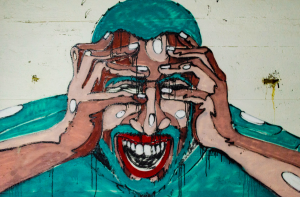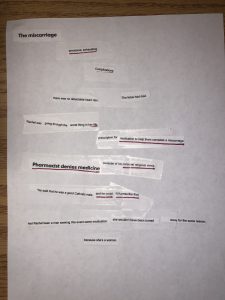 Photo credit to Aarón Blanco Tejedor
Photo credit to Aarón Blanco Tejedor
Amanda Fraticelly
Hailie Addison
Angela McEnerney
Humor
In medieval times humor referred to a human fluid that was thought to measure a human’s mental and physical health. Later on in the 1600s it was used to refer to the style or character of a person or a thing. Today, the concept of humor is most often thought of in the way that the Oxford English Dictionary defines it: the quality of being amusing or comic, especially as expressed in literature or speech. As a verb, it means to be accomodating and adaptable. As the use of the word has changed over time, the emphasis on comedy has become increasingly relevant.
There is a reason why his theatrical storytelling made Shakespeare popular for his poetry and for his politics: he used humor and irony to tell dark stories, ones that were otherwise not palatable for the general public. Humor has developed as a mechanism for addressing difficult topics and easing audiences in to understanding.
In Mean, by Myriam Gurba, both the horrors of coping with sexual assault and the pains growing up experiencing racism in sexism, are brought to attention using a combination of brutal pointedness and humor. The book opens with a graphic and brutal rape and murder scene of a woman named, Sophia Torres. Throughout the book, Gurba reflects on the sexual assaults and abuse she encountered throughout her life. She uses humor as a way to cope with what she went through; by overcoming the trauma of her rape and learning how to let herself live past it. The style in which she uses the concept is unique and important to telling her story. She uses it in moments that can be shocking but she also uses humor in casual, witty, and comical ways.
Currently, discussions surrounding sexual assault are stifled by an unwilling audience, people that don’t want to think about it. In mainstream media outlets, discussion surrounding the significantly higher rate of assault towards minority peoples are almost nonexistent. In Gurba’s writing, she creates a world where these realities are impossible to ignore. She uses her narrative both as a way of personal coping, and also a method of humoring her audience into to thinking hard about the variety of experiences she shares.
How Gurba uses blunt humor to cope with her rape is critical to understanding the way she views her past and her surroundings, but most importantly how she views herself and her process of coping and healing. Gurba writes, “I secrete English, Spanish, and tears, but, like a urinal, I also function as a vessel. I hold sadness, language, memories, and glee” (32). Here, within a beautiful sentiment, Gurba refers to herself as a urinal and it is comical. This is an example of where she uses self deprecating humor to describe how she holds sadness and memories, and in doing so she allows her audience to level with her. This is one example of how she establishes sense of repor with her audience using comical humor.
The sadness and memories she holds resulting from the trauma she has endured are expressed throughout Gurbas book. She recalls various sexual encounters as she was on the pursuit to rid herself of the ghosts haunting her sexuality. Gurba writes: “I’d already become buff and gotten my 4.00, so I gave myself a new challenge: to have sex with a married man. It seemed like a good idea to have sex with someone and ruin his family” (146). It is apparent that at this stage in her life, Gurba does not know how to cope with her suffering, and she uses sex and humor as ways to deal with her inner conflict and the desire to cause someone pain. This is an example of how shock her audience with a raw approach to a situation that people would not likely make jokes about, but Gurba does. Her reckless and unapologetic attitude and humor help her to deal with what she has lived through.
In her book, Gurba also draws attention to the bizarre aspects of human interaction in a humorous way. Following her encounter with the married professor, he says to her, “‘You’ve just been diddled by a Jew. How does it feel?’” And she responds with, ‘Kosher..’” (149). Gurba exhibits that her humor also exists outside of her pain and trauma. She is quick to respond wittily to strange behavior in others. Another example of this is when Gurba’s friend, Ida, accidently smokes crack. Gurba writes, “She once smoked crack on accident. She thought it was heroin” (12). The thought of someone smoking crack on accident can already be amusing to the reader, but her blunt and quick reaction makes it even sharper.
The way she responds to more difficult moments might be seen as surprising and abnormal way she tries to make her audience laugh in moments that don’t seem right. She does something like in her response to her mother leaving. Gurba writes, ““I got that it was important for Dad to go be with Mom, and I kind of got that something very bad might be happening, something that might prevent my mom from ever coming back, but I wasn’t upset by it. I was excited. The abandonment felt like an adventure” (8). Here Gurba uses her humor as an almost positive spin on how she interacts with stress, and introduces the idea that humor is a vital tool for dealing with survivors guilt. When asked about her reasons for writing Mean in her interview with The California Report’s Sasha Khokha, Gurba summarizes: “to construct some sort of meaning to come to some sort of understanding to give myself permission to enjoy being alive” (Gurba, KQED 2018).
In her book she also uses humor in the sense of the verb; she talks about learning to deal with survival, and how to live with her ghosts. Gurba writes: “I’m glad I can keep inhaling the corticosteroid nasal spray that relieves my allergy symptoms. I’m glad I can keep on listening to right wing talk radio for fun” (174). Here she allows her audience to acclimate to a place of familiarity after sharing the brutality of her assault. This is an example of how Gurba actively humors her audience by celebrating the small and relatable sources of satisfaction in life. In the last lines of the book Gurba illustrates the point where humor intersects with harsh reality. She writes: “Somewhere out there, Ida is probably smoking crack on accident. And a woman is getting touched to death.”
Humor is used in literary texts to motivate the reader to think about stories beyond the words they are reading. It is an instrumental way to awaken the conscience of the reader about painful realities often avoided out of fear. This use of humor as a means to impart wisdom is analogous to healing a wound instead of letting it fester. In her book Mean, Gurba uses her story to draw the reader’s attention to facets of life that either go unnoticed or are thought to be too painful to acknowledge. Whether it be to mitigate the impacts of trauma, to anatomize survivors guilt for her audience, or to laugh at the oddities of life and human nature; Myriam Gurba sheds light on the ways humor allows us to survive, observe and experience life more vividly.
Citations:
Gurba, Myriam. Mean. Coffee House Press, 2017.
Khokha, Sasha. “Myriam Gurba’s ‘Mean’: A Memoir of Hurt and Humor.” KQED, 28 Feb. 2018. www.kqed.org/news/11652366/myriam-gurbas-mean-a-memoir-of-hurt-and-humor.
Tejedor Blanco, Aarón. “In a Bunker” Unsplashed, https://unsplash.com/photos/VBe9zj-JHBs.

